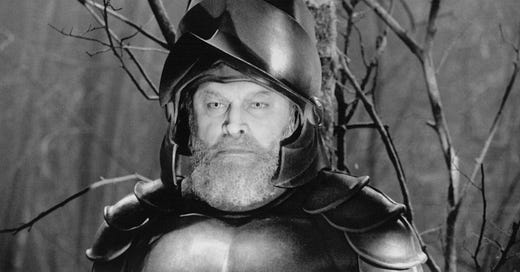Reading Shakespeare’s Hamlet (#4)
An accessible discussion of Shakespeare’s Hamlet (Blog 4) (Act 1, Scene 1)
The ghost has come and gone. Horatio has been proven wrong, it does exist after all.
Marcellus:
‘Tis gone and will not answer.
Barnardo:
How now, Horatio? You tremble and look pale.
Is not this something more than fantasy?
What think you on’t?
Horatio previously dismissed the ghost as ‘fantasy’.
Horatio:
Before my God, I might not this believe
Without the sensible and true avouch
Of mine eyes.
‘Sensible’ meaning the ghost has affected Horatio’s senses. ‘Avouch’ means ‘assurance’.
Marcellus:
Is it not like the King?
Horatio:
As thou art to thyself.
Such was the very armour he had on
When he the ambitious Norway combated.
The ghost was sporting the same armour worn by Hamlet’s late father when he fought the ambitious king of Norway. We’re getting some backstory exposition here. We’ll explore the importance of Norway in the coming passages.
So frowned he once when, in an angry parle,
He smote the sledded poleaxe on the ice.
‘Tis strange.
The ghost also frowned just like the late king when, during a dispute, he fought the Polish who travelled over the ice on sleds. ‘Parle’ means ‘parley’, a dispute between two opposing sides.
Marcellus:
Thus twice before, and jump at this dead hour,
With martial stalk hath he gone by our watch.
‘Jump’ means ‘exactly’. The ghost has come by twice at this exact hour.
‘Martial’ relates to warfare. Each time the king’s ghost has appeared he has been wearing his military gear. This is important as it prompts the subsequent speculation about war preparations taking place in Denmark.
The ghost’s appearance concerns both the main plot – Hamlet’s revenge against his uncle – and one of the subplots – the risk of a Norwegian invasion.
Horatio:
In what particular thought to work I know not.
Horatio cannot determine the ghost’s motivations.
But, in the gross and scope of mine opinion,
This bodes some strange eruption to our state.
‘In the gross and scope’ means ‘in a broad/general sense’. Horatio has little evidence as to the ghost’s intentions, but nonetheless thinks that this doesn’t bode well for their country.




